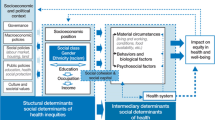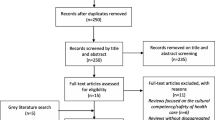Abstract
The National Institutes of Health ismaking efforts to increase the representation ofminority elders in aging research. While it is oftennoted that cultural barriers may make the recruitmentof minority elders into research more difficult,relatively little empirical exists to support thisclaim. The purpose of this study was to identifysociocultural barriers to recruitment that emergedduring a four-year study of dementia caregiving amongChinese families in the Boston area. Morespecifically, this paper examines how culturallyshaped conceptions of health, aging, and dementiaimpacted the recruitment process. This paper is basedon a qualitative analysis of interviews with 23Chinese families and extensive fieldnotes generated byproject ethnographers and interviewers. The followingthemes emerged in this analysis: 1) dementia-relatedchanges were construed as a normal part of the agingprocess rather than a disease, making it moredifficult to identify dementia-affected elders and torecruit families, 2) research participation was viewedas potentially harmful because it can lead toexcessive worry 3) Alzheimer's disease carries asocial stigma among Chinese, leading families to shunformal diagnosis and research participation, and 4)practitioners viewed research as an intrusion offeringno direct benefit to participants.
Similar content being viewed by others
References
Anderson N. B. (1995). Summary of task group research recommendations, Health Psychology 14(7): 649-653.
Arean P. A. & Gallagher-Thompson, D. (1996). Issues and recommendations for the recruitment and retention of older ethnic minority adults into clinical research, Journal of Consulting and Clinical Psychology 64(5): 875-880.
Braun, K. L., Takamura, J. C., Forman, S. M., Saski, P. A. & Meininger, L. (1995). Developing and testing outreach materials on Alzheimer's disease for Asian and Pacific Islander Americans, Gerontologist 35(1): 122-126.
Eliot, K. S., Di Minno, M., Lam, D. & Tu, A.M. (1996). Working with chinese families in the context of dementia. In G. Yeo and D. Gallagher-Thompson (eds), Ethnicity and the dementias. Washington DC: Taylor and Francis.
Guo, Z. Chinese elders in New York City: Aging and healthcare in cultural perspective (in press)
Henderson, J. N. (1990). Anthropology, health, and aging. In R. L. Rubinstein (ed.), Anthropology and aging. Dordrecht, Netherlands: Kluwer Academic Publishers.
Henderson, J. N., Gutierrez-Mayka, M., Garcia, J. & Boyd, S. (1993). A model for Alzheimer's disease support group development in African-American and Hispanic populations, The Gerontologist 30(3): 409-414.
Henderson, J. N. (1994). Ethnic and racial issues. In J. F. Gubrium & A. Sankar (eds), Qualitative methods in aging research. New York: Sage.
Henderson, J. N. (1996). Cultural dynamics of dementia in a Cuban and Puerto Rican population in the United States. In G. Yeo and D. Gallager-Thompson (eds), Ethnicity and the dementias. Washington DC: Taylor and Francis.
Herkovits, E. (1995). Struggling over subjectivity: debates about the “self” and Alzheimer's disease, Medical Anthropology Quarterly 9: 146-164.
Hinton, W. L. & Kleinman, A. (1995). An agenda for research. In B. Desjarlais, A. Kleinman, L. Eisenberg and B. Good (eds), World mental health. England: Oxford University Press
Hinton, W. L. & Kleinman, A. (1997). Cultural issues in primary care medicine. In J. Noble, H. Green, J. Heffernan, W. Levinson & G. Modest (eds), Primary care medicine CD-ROM. Mosby-Yearbook.
Hinton, W. L. & Levkoff, S. (1999). Constructing Alzheimer's: Narratives of lost identities, confusion, and loneliness in old age, Culture, Medicine, and Psychiatry 23: 453-475.
Hohman, A. A. & Parron, D. L. (1996). How the new NIH guidelines on inclusion of women and minorities apply: Efficacy trials, effectiveness trials, and validity, Journal of Consulting and Clinical Psychology 64(5): 851-855.
Holzman, C. S. (1982). Ethnicity and aging: Anthropological perspectives on more than just the minority elderly, Gerontologist 22(3): 249-257.
Ikels, C. (1989). Becoming a human being in theory and in practice: Chinese views of human development. In D. Kertzer & K. W. Schaie (eds), Social structure and aging: Comparative perspectives on age structuring in modern societies. Hillsdale, NJ: Erlbaum.
Ikels, C. (1997). Long-term care and disabled elderly in Urban China. In J. Sokolovsky (ed.), The cultural context of aging. Westport, Connecticut: Bergin & Garvey.
Kramer, B. J. & Barker, J. C. (1994). Ethnicity in the elderly, Journal of Cross-Cultural Gerontology 9: 403-417.
Kaufman, B. D. & Rodriquez-Trias, H. (1994). Participant and community issues in the recruitment and retention of women in clinical studies. In Recruitment and Retention of Women in Clinical Studies. US Department Health and Human Services. Bethesda NIH Publication No 95-3756.
Kleinman, A., Eisenberg, L. & Good, B. (1978). Culture, illness, and care: Clinical lessons from anthropologic and cross-cultural research, Annals of Internal Medicine 88: 251-258.
Kleinman, A. (1983). The cultural meanings of social use of illness, The Journal of Family Practice 16: 539-545.
Kleinman, A. (1988). Rethinking psychiatry. New York: Free Press.
Kleinman, A. (1995). Writing at the margin: Discourse between anthropology and medicine. Berkeley: University of California Press.
Levkoff, S., Lui, B., Fung, S., Hinton, L. & Chang, K. (1998). The evolution of a culturally distinct support groups for Chinese caregivers of dementia-impaired elders: Trial and error, Alzheimer's Reports 1(2): 734-4432.
Lin, K. M. (1981). Traditional Chinese medical beliefs and their relevance for mental illness and psychiatry. In A. Kleinman & T. Y. Lin (eds), Normal and abnormal behavior in Chinese culture. Dordrecht, Netherlands: Reidel.
Lin, T. Y. & Lin, M. C. (1981). Love, denial, and rejection: Responses of Chinese families to mental illness. In A. Kleinman & T. Y. Lin (eds), Normal and abnormal behavior in Chinese culture. Dordrecht, Netherlands: Reidel.
Phillips, M. R. (1993). Strategies used by Chinese families coping with Schizophrenia. In D. Davis & S. Harrell (eds), Chinese families in the post-Mao era. Berkeley: University of California Press.
Sankar, A. “It's just old age”: Old atge as a diagnosis in American and Chinese medicine. In D. Kertzer and J. Keith (eds), Age and anthroplogical theory. Ithaca, NY: Cornell University Press.
Strauss, A. L. & Corbin, J. (1990). Basics of qualitative research: Grounded theory procedures and techniques. Newbury Park, CA: Sage Publications.
Valle, R. (1989). Cultural and ethnic issues in Alzheimer's disease family research. In E. Light & B. D. Lebowitz (eds), Alzheimer's disease treatment and family stress: Directions for research. Washington, DC: National Institute of Mental Health.
Valle, R. (1998). Caregiving across cultures: Working with dementing illness and ethnically diverse populations. Washington D.C.: Taylor and Francis.
Wykle, M. & Kaskel. B. (1994). Increasing the longevity of minority older adults through improved health status. In Minority elders: Five goals toward building a public policy base. Washington DC: The Gerontological Society of America.
Rights and permissions
About this article
Cite this article
Hinton, L., Guo, Z., Hillygus, J. et al. Working with culture: A qualitative analysis of barriers to the recruitment of Chinese–American family caregivers for dementia research. Journal of Cross-Cultural Gerontology 15, 119–137 (2000). https://doi.org/10.1023/A:1006798316654
Issue Date:
DOI: https://doi.org/10.1023/A:1006798316654




